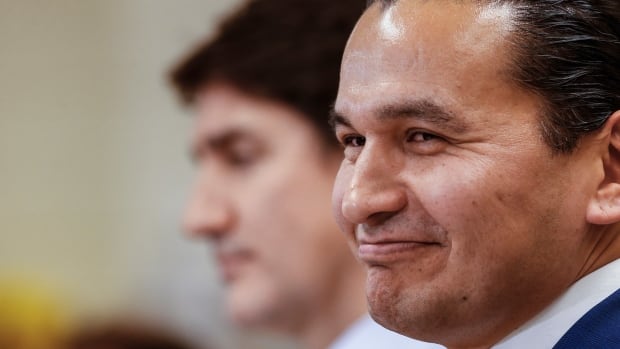
Manitoba Premier Wab Kinew is urging the federal government to speed up its plan to reach NATO’s spending benchmark in order to save the Canada-U.S. trade relationship ahead of potentially shifting sands south of the border.
After years of criticism from allies — most notably the United States — the Liberal government announced last week that it hopes to meet NATO’s military investment commitment of two per cent of alliance members’ gross domestic product by 2032.
Speaking on the last day of the premiers’ annual summer meeting, Kinew said Prime Minister Justin Trudeau should reach two per cent spending in four years.
“I want Canadians to see this as a national security thing. It’s an investment in the Canadian Armed Forces, but I encourage Canadians to think about this also as an investment in trade,” Kinew told reporters before going into closed-door meetings.
“If we’re not meeting our responsibility to our NATO allies, it is going to have an impact on [the Canada-United States-Mexico Agreement] renewal. It is gonna have an impact on the relationship.”
Premiers have been discussing the Canada-U.S. relationship during the Council of the Federation meeting in Halifax this week, with an eye to the U.S. presidential election in November.
Nova Scotia Premier Tim Houston, chair of this year’s meetings, said Tuesday the provinces are working to maintain that relationship, no matter who wins, given the U.S. buys about three-quarters of Canada’s exports.
Kinew said the premiers, and the economic success of their economies, need the federal government to see defence as a trade issue when it comes to Canada’s neighbour to the south.
“The point that I’m making is we need to invest in national security, but we also need the federal government in this area, clearly a federal responsibility, to do their part,” he said.
“I am concerned that if we don’t hit that two per cent target within the next four years … it is going to become a trade issue, it is going to become a trade irritant.”
Trump stresses NATO contributions
Premier Doug Ford also told reporters he supports the government moving the target to appease the United States.
Canada currently sets aside a sum equivalent to 1.3 per cent of its GDP for the military. Before last week’s announcement, it had a plan to reach 1.76 per cent by the end of the decade, but other alliance members have been insisting Canada deliver some kind of plan to get to two per cent.
Trump has encouraged Russia to do “whatever the hell they want” to any NATO member country that doesn’t meet spending guidelines on defence.
“NATO was busted until I came along,” Trump said at a rally earlier this year. “I said, ‘Everybody’s gonna pay.’ They said, ‘Well, if we don’t pay, are you still going to protect us?’ I said, ‘Absolutely not.’ They couldn’t believe the answer.”
In May, a group of U.S. senators from both major parties sent a letter to Trudeau urging the Liberal government to boost defence spending to the NATO target.
Last Thursday, U.S. Ambassador to Canada David Cohen released a statement saying the Biden administration is pleased to see Canada present a timeline for meeting the target.
Conservative Leader Pierre Poilievre has said he won’t commit to meeting the two per cent NATO defence spending target if he becomes prime minister.
“I make promises that I can keep, and right now … our country is broke,” Poilievre said. “I’m inheriting a dumpster fire when it comes to the budget.
“Every time I make a financial commitment, I’m going to make sure I’ve pulled out my calculator and done all the math. People are sick and tired of politicians just announcing that they’re going to spend money without figuring out how they’re going to pay for it.”